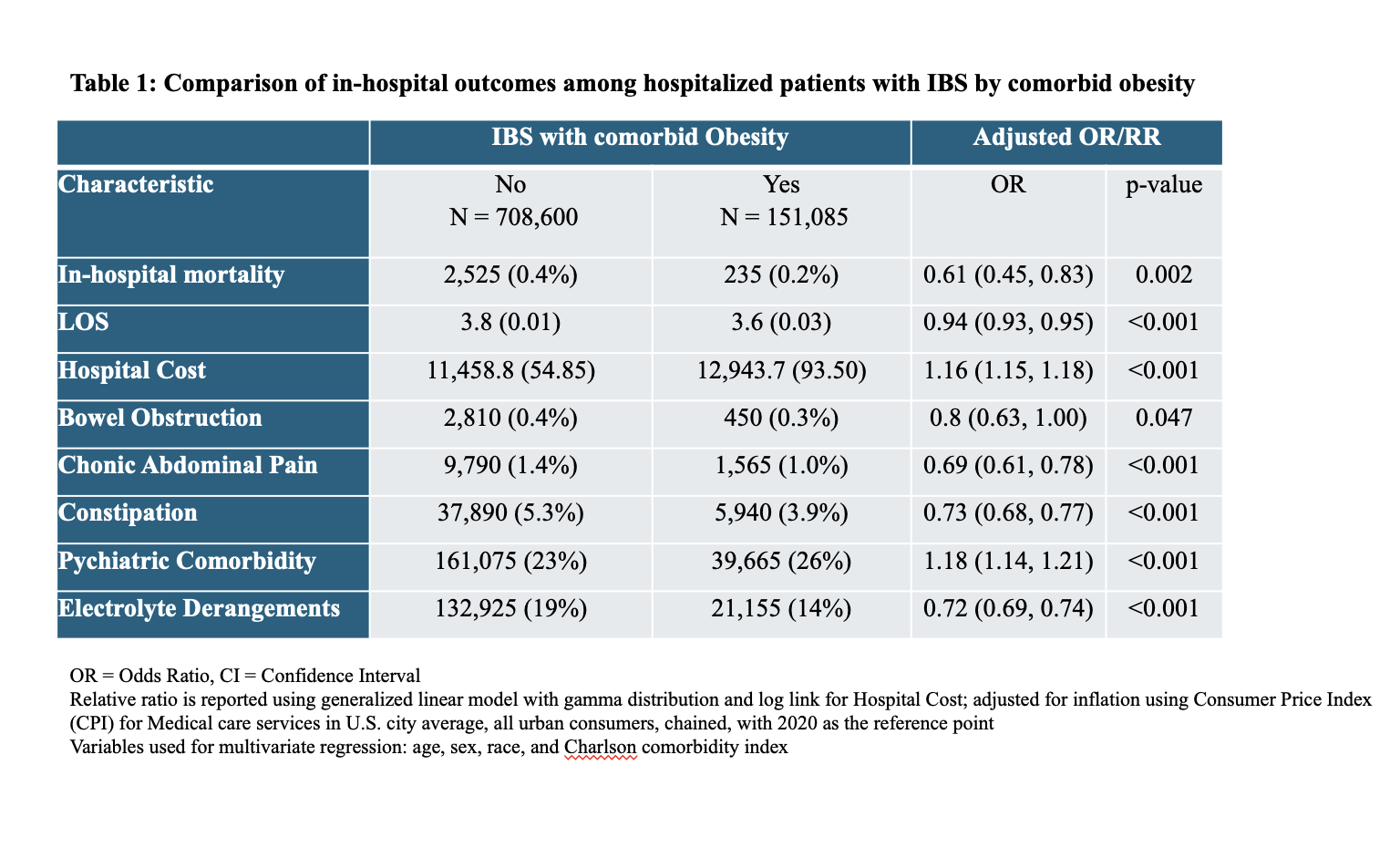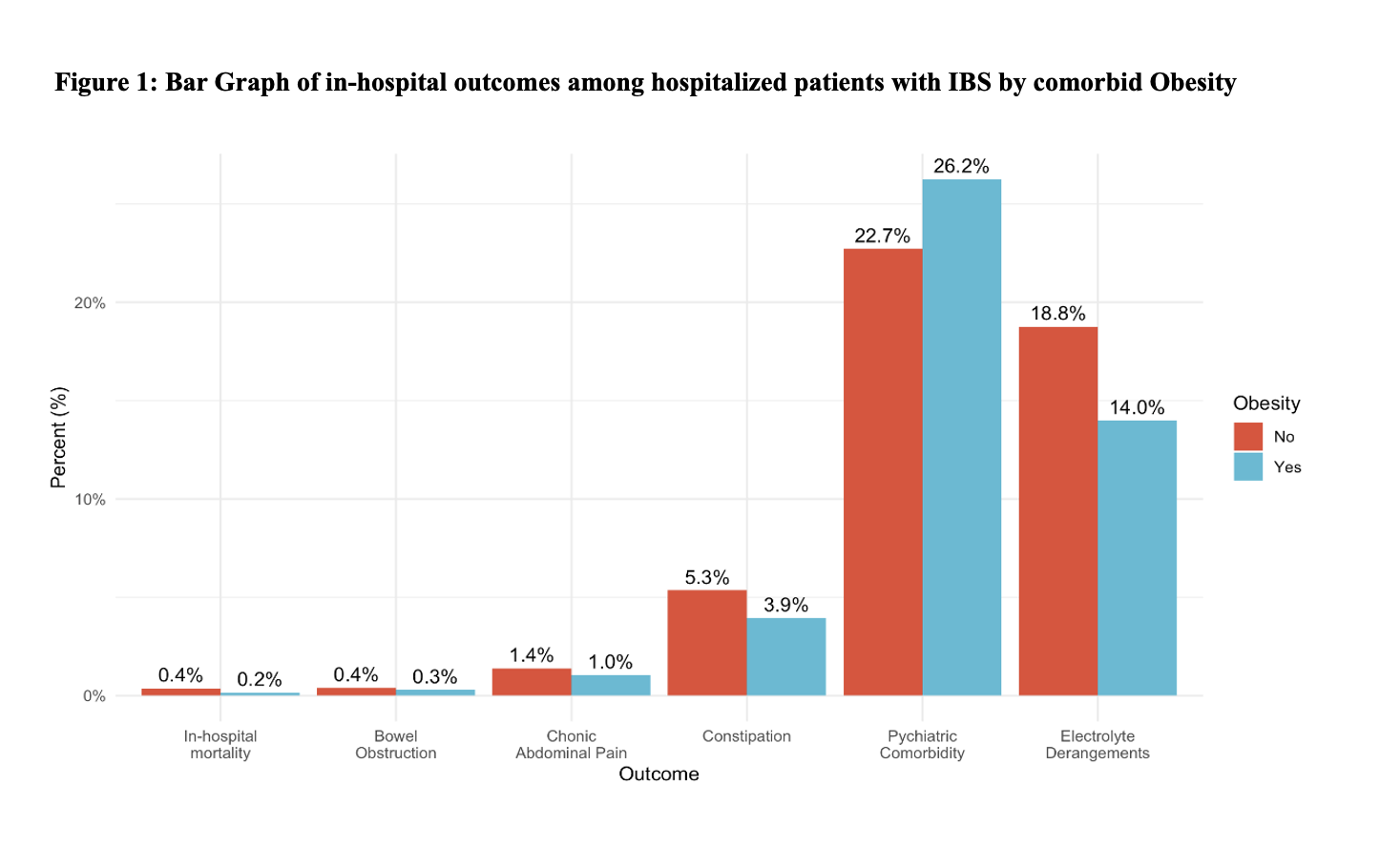Sunday Poster Session
Category: Functional Bowel Disease
P0786 - Inpatient Outcomes in Irritable Bowel Syndrome With Comorbid Obesity: A National Cohort Study
Sunday, October 26, 2025
3:30 PM - 7:00 PM PDT
Location: Exhibit Hall

Anwar Uddin, MD (he/him/his)
SUNY Downstate Health Sciences University
Brooklyn, NY
Presenting Author(s)
Anwar Uddin, MD, Rahat Uddin, MS, Madia Ahad, MD, Peter Lymberopoulos, MD, Savanna Thor, DO, MPH
SUNY Downstate Health Sciences University, Brooklyn, NY
Introduction: Irritable bowel syndrome (IBS) is a common gastrointestinal disorder often complicated by systemic comorbidities, including obesity. Obesity may affect IBS-related outcomes through alterations in gut motility, low-grade inflammation, and neuroendocrine signaling. This study aimed to evaluate inpatient outcomes in hospitalized adults with IBS, comparing those with and without comorbid obesity.
Methods: We conducted a retrospective cohort analysis using the National Inpatient Sample (NIS) from 2016 to 2020. Adult patients aged 18 years and older with a diagnosis of IBS (ICD-10 codes K58.0–K58.9) listed among the first ten discharge diagnoses were included. Comorbid obesity was identified using ICD-10 codes E66.0–E66.9. Outcomes included inpatient mortality, length of stay (LOS), total hospital cost, bowel obstruction, chronic abdominal pain, constipation, psychiatric comorbidities, and electrolyte derangements. Multivariable logistic regression models were used to evaluate associations, adjusting for age, sex, race, and Charlson Comorbidity Index. Hospital cost was analyzed using a generalized linear model with a gamma distribution and log link, adjusted to 2020 U.S. dollars using the Consumer Price Index.
Results: Among 859,685 hospitalized patients with IBS, 151,085 (17.6 percent) had comorbid obesity. Among hospitalized IBS patients, those with comorbid obesity demonstrated significantly lower odds of in-hospital mortality (0.2% vs. 0.4%; OR: 0.61, 95% CI: 0.45–0.83) and shorter LOS (3.6 vs. 3.8 days; OR: 0.94, 95% CI: 0.93–0.95), but incurred higher hospital costs ($12,943.7 vs. $11,458.8; OR: 1.16, 95% CI: 1.15–1.18). They had reduced odds of bowel obstruction (OR: 0.80, 95% CI: 0.63–1.00), chronic abdominal pain (OR: 0.69, 95% CI: 0.61–0.78), constipation (OR: 0.73, 95% CI: 0.68–0.77), and electrolyte derangements (OR: 0.72, 95% CI: 0.69–0.74). However, they were more likely to have psychiatric comorbidities (OR: 1.18, 95% CI: 1.14–1.21).
Discussion: Hospitalized patients with IBS and comorbid obesity had lower inpatient mortality, shorter length of stay, and fewer complications including bowel obstruction and electrolyte abnormalities, despite higher hospitalization costs and a greater burden of psychiatric comorbidities. These findings warrant further study to clarify the clinical implications of obesity in this population.

Figure: Table 1: Comparison of in-hospital outcomes among hospitalized patients with IBS by comorbid obesity

Figure: Figure 1: Bar Graph of in-hospital outcomes among hospitalized patients with IBS by comorbid Obesity
Disclosures:
Anwar Uddin indicated no relevant financial relationships.
Rahat Uddin indicated no relevant financial relationships.
Madia Ahad indicated no relevant financial relationships.
Peter Lymberopoulos indicated no relevant financial relationships.
Savanna Thor indicated no relevant financial relationships.
Anwar Uddin, MD, Rahat Uddin, MS, Madia Ahad, MD, Peter Lymberopoulos, MD, Savanna Thor, DO, MPH. P0786 - Inpatient Outcomes in Irritable Bowel Syndrome With Comorbid Obesity: A National Cohort Study, ACG 2025 Annual Scientific Meeting Abstracts. Phoenix, AZ: American College of Gastroenterology.
SUNY Downstate Health Sciences University, Brooklyn, NY
Introduction: Irritable bowel syndrome (IBS) is a common gastrointestinal disorder often complicated by systemic comorbidities, including obesity. Obesity may affect IBS-related outcomes through alterations in gut motility, low-grade inflammation, and neuroendocrine signaling. This study aimed to evaluate inpatient outcomes in hospitalized adults with IBS, comparing those with and without comorbid obesity.
Methods: We conducted a retrospective cohort analysis using the National Inpatient Sample (NIS) from 2016 to 2020. Adult patients aged 18 years and older with a diagnosis of IBS (ICD-10 codes K58.0–K58.9) listed among the first ten discharge diagnoses were included. Comorbid obesity was identified using ICD-10 codes E66.0–E66.9. Outcomes included inpatient mortality, length of stay (LOS), total hospital cost, bowel obstruction, chronic abdominal pain, constipation, psychiatric comorbidities, and electrolyte derangements. Multivariable logistic regression models were used to evaluate associations, adjusting for age, sex, race, and Charlson Comorbidity Index. Hospital cost was analyzed using a generalized linear model with a gamma distribution and log link, adjusted to 2020 U.S. dollars using the Consumer Price Index.
Results: Among 859,685 hospitalized patients with IBS, 151,085 (17.6 percent) had comorbid obesity. Among hospitalized IBS patients, those with comorbid obesity demonstrated significantly lower odds of in-hospital mortality (0.2% vs. 0.4%; OR: 0.61, 95% CI: 0.45–0.83) and shorter LOS (3.6 vs. 3.8 days; OR: 0.94, 95% CI: 0.93–0.95), but incurred higher hospital costs ($12,943.7 vs. $11,458.8; OR: 1.16, 95% CI: 1.15–1.18). They had reduced odds of bowel obstruction (OR: 0.80, 95% CI: 0.63–1.00), chronic abdominal pain (OR: 0.69, 95% CI: 0.61–0.78), constipation (OR: 0.73, 95% CI: 0.68–0.77), and electrolyte derangements (OR: 0.72, 95% CI: 0.69–0.74). However, they were more likely to have psychiatric comorbidities (OR: 1.18, 95% CI: 1.14–1.21).
Discussion: Hospitalized patients with IBS and comorbid obesity had lower inpatient mortality, shorter length of stay, and fewer complications including bowel obstruction and electrolyte abnormalities, despite higher hospitalization costs and a greater burden of psychiatric comorbidities. These findings warrant further study to clarify the clinical implications of obesity in this population.

Figure: Table 1: Comparison of in-hospital outcomes among hospitalized patients with IBS by comorbid obesity

Figure: Figure 1: Bar Graph of in-hospital outcomes among hospitalized patients with IBS by comorbid Obesity
Disclosures:
Anwar Uddin indicated no relevant financial relationships.
Rahat Uddin indicated no relevant financial relationships.
Madia Ahad indicated no relevant financial relationships.
Peter Lymberopoulos indicated no relevant financial relationships.
Savanna Thor indicated no relevant financial relationships.
Anwar Uddin, MD, Rahat Uddin, MS, Madia Ahad, MD, Peter Lymberopoulos, MD, Savanna Thor, DO, MPH. P0786 - Inpatient Outcomes in Irritable Bowel Syndrome With Comorbid Obesity: A National Cohort Study, ACG 2025 Annual Scientific Meeting Abstracts. Phoenix, AZ: American College of Gastroenterology.
